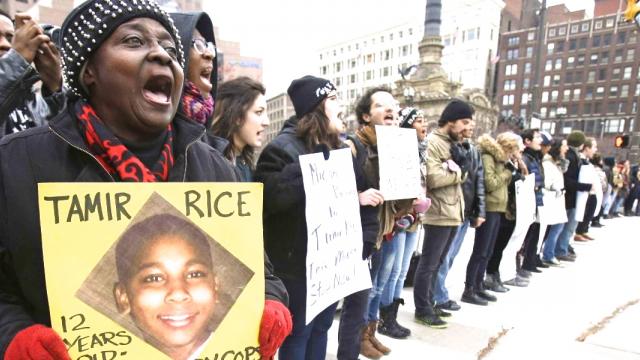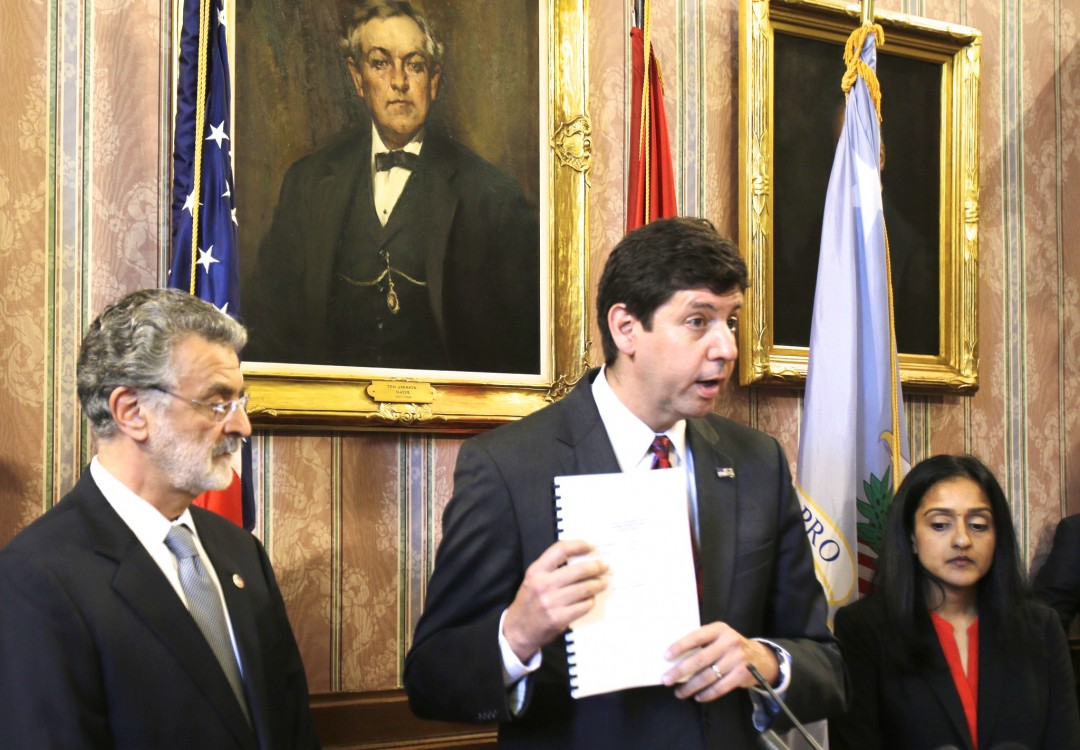
Federal prosecutors have announced a settlement with Cleveland in which the city’s police department agreed to take steps to correct a pattern of abusive behavior by officers.
The announcement makes Cleveland the first American city to have cut two such deals to rein in its police force.
Federal prosecutors announced the most recent settlement at a news conference at Cleveland city hall Tuesday afternoon. The deal was reached after investigators documented a pattern of harsh and chronic abuse by police officers in a December 2014 report.
The settlement mandates an independent police monitor, body cameras for all officers, and additional officer training, among other measures.
Steven M. Dettelbach, U.S. attorney for the northern district of Ohio, hailed the deal as “a historic agreement that will transform the way the city of Cleveland is policed for years and years to come.”
The agreement provided more than an echo of a settlement reached 11 years ago between the justice department and the Cleveland police department, following a similar federal investigation of similar reported abuses by Cleveland police. That agreement instituted a ban on officers firing at moving vehicles and required investigations of all officer-involved shootings.
Cleveland mayor Frank Jackson, who was first elected in 2005 in part on a promise to reform policing in the city and who now faces a recall petition based on what some Clevelanders say has been his failure to do so, did not mention the earlier settlement in an appearance Tuesday.
“This is a transformative time with the city of Cleveland division of police, but most important with the citizens of Cleveland,” Jackson said. “Today marks a new way of policing in the city of Cleveland, one built on a strong foundation of systemic change.”
“At the end, we will have community policing as part of our DNA.”
The 105-page comprehensive consent decree outlines reforms in six categories including use-of-force, community policing, equipment and staffing, accountability, bias-free policing and crisis intervention. The agreement calls for “state-of-the-art training” to ensure that “any use of force is constitutional and lawful,” Dettelbach said.
It establishes a new inspector general of police to be appointed by the mayor, and a new civilian oversight post in the internal affairs division of the Cleveland division of police.
The justice department opened its most recent investigation of Cleveland police after multiple reports of abuse, including a November 2012 incident in which police officer Michael Brelo climbed onto the hood of a vehicle following a car chase and fired 15 times through the windshield. Two unarmed passengers, Malissa Williams and Timothy Russell, both African American, died in the shooting, in which officers fired a total of 137 shots. Brelo was acquitted on Saturday.
Jackson said peaceful protests in the wake of the Brelo verdict had buttressed his faith “that Cleveland is a city for peaceful demonstrations and dialogue.”
The Cleveland settlement is one of about two dozen such deals between the justice department and local law enforcement since the 1994 Violent Crime Control and Law Enforcement Act gave Washington the authority to investigate improper use of force by police, unlawful stops and searches, and biased policing.
The first major consent decree, as the deals are known, was reached in 1997 in Pittsburgh, following a federal complaint prompted after an African American man died while being taken into custody by four police officers following a low-speed car chase, and after a white police officer shot dead two black men in a car that had dragged him.
The justice department reached three such settlements in 2014, with New Orleans; Newark, New Jersey; and Albuquerque. Two current federal investigations – into policing practices in the cities of Ferguson, Missouri, and Baltimore – are ongoing. The justice department released its report on police abuses in Ferguson in March.
The report on Cleveland, released in December, found “a pattern or practice of using unreasonable force in violation of the fourth amendment”, including “the unnecessary and excessive use of deadly force, including shootings and head strikes with impact weapons”; “the unnecessary, excessive or retaliatory use of less lethal force including Tasers, chemical spray and fists”; and “excessive force against persons who are mentally ill or in crisis, including in cases where the officers were called exclusively for a welfare check”.
In one case, police Tasered a man strapped to a gurney. In another, they repeatedly punched a handcuffed teenager who had been accused of shoplifting. The investigation began before a police officer shot 12-year-old Tamir Rice dead in a Cleveland park last November.
3 WAYS TO SHOW YOUR SUPPORT
- Log in to post comments












